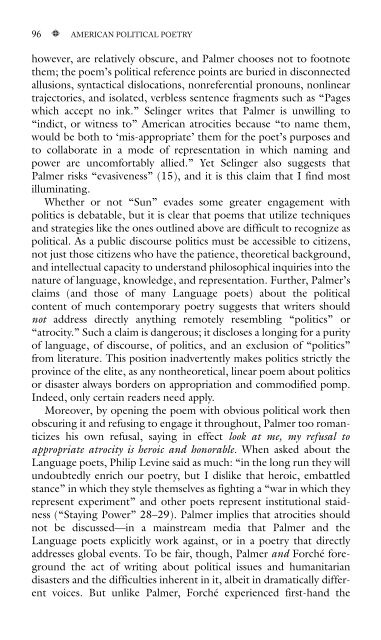american political poetry in the 21st century - STIBA Malang
american political poetry in the 21st century - STIBA Malang
american political poetry in the 21st century - STIBA Malang
You also want an ePaper? Increase the reach of your titles
YUMPU automatically turns print PDFs into web optimized ePapers that Google loves.
96 AMERICAN POLITICAL POETRY<br />
however, are relatively obscure, and Palmer chooses not to footnote<br />
<strong>the</strong>m; <strong>the</strong> poem’s <strong>political</strong> reference po<strong>in</strong>ts are buried <strong>in</strong> disconnected<br />
allusions, syntactical dislocations, nonreferential pronouns, nonl<strong>in</strong>ear<br />
trajectories, and isolated, verbless sentence fragments such as “Pages<br />
which accept no <strong>in</strong>k.” Sel<strong>in</strong>ger writes that Palmer is unwill<strong>in</strong>g to<br />
“<strong>in</strong>dict, or witness to” American atrocities because “to name <strong>the</strong>m,<br />
would be both to ‘mis-appropriate’ <strong>the</strong>m for <strong>the</strong> poet’s purposes and<br />
to collaborate <strong>in</strong> a mode of representation <strong>in</strong> which nam<strong>in</strong>g and<br />
power are uncomfortably allied.” Yet Sel<strong>in</strong>ger also suggests that<br />
Palmer risks “evasiveness” (15), and it is this claim that I f<strong>in</strong>d most<br />
illum<strong>in</strong>at<strong>in</strong>g.<br />
Whe<strong>the</strong>r or not “Sun” evades some greater engagement with<br />
politics is debatable, but it is clear that poems that utilize techniques<br />
and strategies like <strong>the</strong> ones outl<strong>in</strong>ed above are difficult to recognize as<br />
<strong>political</strong>. As a public discourse politics must be accessible to citizens,<br />
not just those citizens who have <strong>the</strong> patience, <strong>the</strong>oretical background,<br />
and <strong>in</strong>tellectual capacity to understand philosophical <strong>in</strong>quiries <strong>in</strong>to <strong>the</strong><br />
nature of language, knowledge, and representation. Fur<strong>the</strong>r, Palmer’s<br />
claims (and those of many Language poets) about <strong>the</strong> <strong>political</strong><br />
content of much contemporary <strong>poetry</strong> suggests that writers should<br />
not address directly anyth<strong>in</strong>g remotely resembl<strong>in</strong>g “politics” or<br />
“atrocity.” Such a claim is dangerous; it discloses a long<strong>in</strong>g for a purity<br />
of language, of discourse, of politics, and an exclusion of “politics”<br />
from literature. This position <strong>in</strong>advertently makes politics strictly <strong>the</strong><br />
prov<strong>in</strong>ce of <strong>the</strong> elite, as any non<strong>the</strong>oretical, l<strong>in</strong>ear poem about politics<br />
or disaster always borders on appropriation and commodified pomp.<br />
Indeed, only certa<strong>in</strong> readers need apply.<br />
Moreover, by open<strong>in</strong>g <strong>the</strong> poem with obvious <strong>political</strong> work <strong>the</strong>n<br />
obscur<strong>in</strong>g it and refus<strong>in</strong>g to engage it throughout, Palmer too romanticizes<br />
his own refusal, say<strong>in</strong>g <strong>in</strong> effect look at me, my refusal to<br />
appropriate atrocity is heroic and honorable. When asked about <strong>the</strong><br />
Language poets, Philip Lev<strong>in</strong>e said as much: “<strong>in</strong> <strong>the</strong> long run <strong>the</strong>y will<br />
undoubtedly enrich our <strong>poetry</strong>, but I dislike that heroic, embattled<br />
stance” <strong>in</strong> which <strong>the</strong>y style <strong>the</strong>mselves as fight<strong>in</strong>g a “war <strong>in</strong> which <strong>the</strong>y<br />
represent experiment” and o<strong>the</strong>r poets represent <strong>in</strong>stitutional staidness<br />
(“Stay<strong>in</strong>g Power” 28–29). Palmer implies that atrocities should<br />
not be discussed—<strong>in</strong> a ma<strong>in</strong>stream media that Palmer and <strong>the</strong><br />
Language poets explicitly work aga<strong>in</strong>st, or <strong>in</strong> a <strong>poetry</strong> that directly<br />
addresses global events. To be fair, though, Palmer and Forché foreground<br />
<strong>the</strong> act of writ<strong>in</strong>g about <strong>political</strong> issues and humanitarian<br />
disasters and <strong>the</strong> difficulties <strong>in</strong>herent <strong>in</strong> it, albeit <strong>in</strong> dramatically different<br />
voices. But unlike Palmer, Forché experienced first-hand <strong>the</strong>










